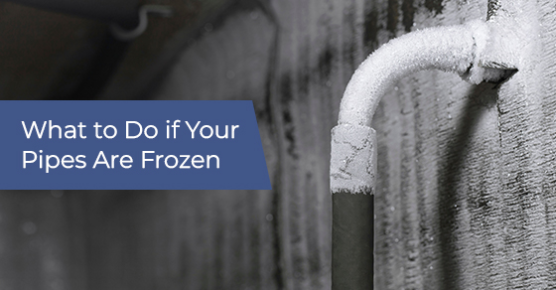
Cold weather brings lots of problems. Between icy highways, skyrocketing heating bills, and driveways full of snow, it’s no wonder that you’re dreaming of spring. However, cold weather can unleash another disaster in your home: frozen and burst pipes.
When the weather gets too cold, pipes begin to freeze and run the risk of bursting. Exterior pipes and pipes hidden in uninsulated areas are most vulnerable to freezing.
If your pipes are frozen, you should contact your plumber immediately. They can safely and effectively thaw problematic pipes before they burst. Although many frozen pipes thaw on their own, it’s not really a risk you want to take.
The first and most obvious sign that your pipes have frozen is a limited water supply. For example, you turn the tap on full blast and only a trickle of water comes out. If this happens while it’s below freezing outside, then there’s a good chance that your pipes are frozen.
However, a dwindling and dribbling water supply is not the only sign that something is wrong. Check the pipes for bulging, condensation, and cracks. Water expands as it freezes, causing extreme pressure to build up within the pipe. This can make the pipe bulge noticeably. Additionally, a layer of condensation or small surface cracks can indicate that the pipe is freezing.
Frozen pipes may also make banging or gurgling sounds, caused by ice travelling through the pipes. Furthermore, a frozen exterior sewer line can lead to unpleasant smells emanating from your faucets.
First and foremost, frozen pipes are a serious issue best left to the expertise of a plumber. Although there are things you can do to mitigate the potential damage from a frozen pipe, ultimately, you should defer to a professional.
Attempting to dethaw your pipes can lead to extensive damage not only to your plumbing system, but your property as a whole.
If your pipes are frozen, call your plumber immediately. They’ll be able to locate and safely thaw the pipes, even in hard-to-reach places like behind finished walls. Moreover, they can replace any burst pipes and add insulation to exposed pipes.
If you’re trying to thaw the pipes on your own, be extremely cautious. Never use an open flame device like a blowtorch, propane or kerosene heater, or charcoal stove. These are severe fire hazards.
Additionally, you should also avoid using a space heater around flammable material. Never leave a heater unattended.
Even if your pipes are entirely frozen and no water is getting through, you should turn off the main water line. This prevents a potential disaster if a pipe bursts. Turning off the water supply limits the amount of water that can flow from a burst pipe.
As the pipes thaw, water and steam are created. If the faucets are closed, there is nowhere for the water and steam to go, thus creating even more pressure within the pipes and increasing the likelihood of a burst. Furthermore, turning on the faucet allows for moving water to travel through the pipes, which helps with thawing.
If you have access to the frozen pipe, there are a few ways to go about thawing it. You will need to apply heat to the section of the pipe that is frozen. This is best done with towels soaked in hot water, an electronic heating pad, or a hairdryer. Do not leave the heating pad unattended, as it is a fire hazard.
It’s much harder to thaw a pipe that’s hidden behind a finished wall. Your best bet is to turn up the thermostat, use an infrared lamp to thaw the pipe through the wall, or remove a section of the wall to gain access to the pipe.
Frankly, you should immediately call your plumber if this is the case.
Prevention is your best strategy for combating frozen pipes. To prevent pipes from freezing, follow these steps:
If you do have frozen pipes, it’s best to call the professionals. The award-winning plumbers at Advanced Plumbing will get your home’s plumbing system working safely and effectively. Not only will we restore water flow to your home, but we also check for any cracks and damage that can cause trouble down the road.
If you’re experiencing frozen pipes (or if you need drain repair), you need to contact a reputable plumbing service like Advanced Plumbing. To book an appointment, call us today at 866-863-9539 or contact us here.